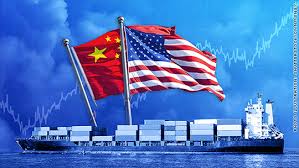In Italy, Pompeo Cannot Sidestep Impeachment Talk, Trade War Gripes, and One Giant Wedge of Cheese

Secretary of State Mike Pompeo’s first public appearance on his tour of southern European was meant to be a low-key photo-op with Italian Prime Minister Giuseppe Conte. It got hijacked in the opening moments, however, when an Italian journalist provocateur, Alice Martinelli, broke protocol, hopped onto the dais and gave Pompeo a wedge of parmesan cheese.
“We hope you can help us and take this cheese to Mr. Trump,” Martinelli, who appears on the Italian news program, “The Hyenas,” told Pompeo in heavily accented English. “Take it to Mr. Trump, and tell him he should not put a tax on what we make with our hearts.”
Security escorted Martinelli away as Pompeo laughed good-naturedly. But Conte was embarrassed and perturbed. “Leave these issues to me, the prime minister,” he said.
Pompeo, who will be in Italy until Friday as part of a whirlwind tour of four countries, has a to-do list full of weighty issues ranging from sanctions on Russia and Iran, to high-tech intellectual property issues, to religious persecution and Mediterranean migration. Meanwhile, the American press corps following Pompeo is fixated on his role in the Trump impeachment saga playing out in Washington.
On Wednesday, Pompeo dropped a bomb, admitting for the first time he was listening in on Donald Trump’s July 25th call to Ukraine President Volodymyr Zelensky which led to the whistleblower report and subsequent impeachment inquiry by House Democrats.
But all Europeans wants to talk about is the collateral damage to Europe of the Trump Administration’s expanding trade war with its trading partners. There is fear of further direct tariffs levied on goods coming out of the eurozone, which economists say would deal the 28-nation bloc a serious setback as it teeters on the edge of recession.
That fear has been palpable on the streets of Rome this week.
There were protests outside the residence of Italian President Sergio Mattarella when Pompeo arrived for his meeting there, with placards reading “Don’t kill Italian food,” and “Mr. Pompeo, we are friends.”
Asked for a summary of his meeting with Pompeo, Italian Minister of Foreign Affairs Luigi Di Maio jumped straight to the T-word. “The issue worries us a great deal since there are many Italian companies that live on exports,” Di Maio said.
Already, Greek president Prokopis Pavlopoulos told reporters there that the tariff issue would be at the top of his agenda when he meets Pompeo at the end of the secretary of state’s European tour.
“Everyone is right to be concerned since the knock-on effects of a new round of U.S. tariffs would have serious consequences for Europe,” Adam Slater, lead economist for Oxford Economics, a forecasting and quantitative analysis group, told Fortune. “Layered on top of the worldwide economic slowdown, and the trade war between the U.S. and China, more tariffs will compound the problem and would ultimately manipulate markets.”
If the EU retaliates with its own tariffs, as is likely, Slater said, the impact would be even more severe to an already fragile global economy. On Tuesday, the World Trade Organization lowered its 2019 global growth forecast, citing escalating trade tensions and slowing economies.
The cheese that took center-stage at the Pompeo-Conte photo-op is a prime example.
Confagricoltura, a leading agricultural federation, estimates that the current U.S. tariffs on European cheese will result in 400,000 fewer 85-pound wheels of parmesan sold in U.S. markets. At current wholesale prices that adds up to more than $ 350 million in sales. Not only is that an enormous economic blow to cheesemakers, it also opens the door to cheaper, faux versions that will hurt the image of the Italian original.
The same story is repeated when it comes to precision machine parts exported to the U.S. from Germany, wine coming from France, chemical exports from the Netherlands, or pharmaceuticals from Spain.
On Wednesday, more unsettling news came out of the WTO. The organization’s mediators gave the United States approval to inflict $ 7.5 billion in new tariffs against European companies as part of the dispute between Airbus and Boeing dating back 15 years. Europe is likely to issue its own complaint against Boeing, which could ultimately lead to a tit-for-tat skirmish between the trading partners.
It is worth noting that, according to data from Oxford Economics, two-way trade between the U.S. and the European Union last year totaled $ 808 billion, nearly one-third larger than the estimated $ 620 billion in trade between the U.S. and China.
More must-read stories from Fortune:
—WeWork IPO filing withdrawn as roadshow leads to a dead end
—What’s the difference between a recession and a depression? Here’s what history tells us
—Charles Schwab on the lessons he’s learned over a lifetime of investing
—The 5 most valuable unicorns, according to their latest funding rounds
—“Performance chasing”—and why it can be perilous for your portfolio


